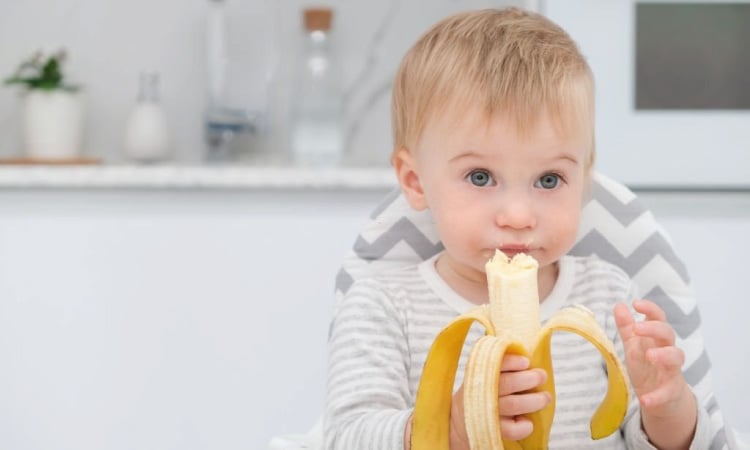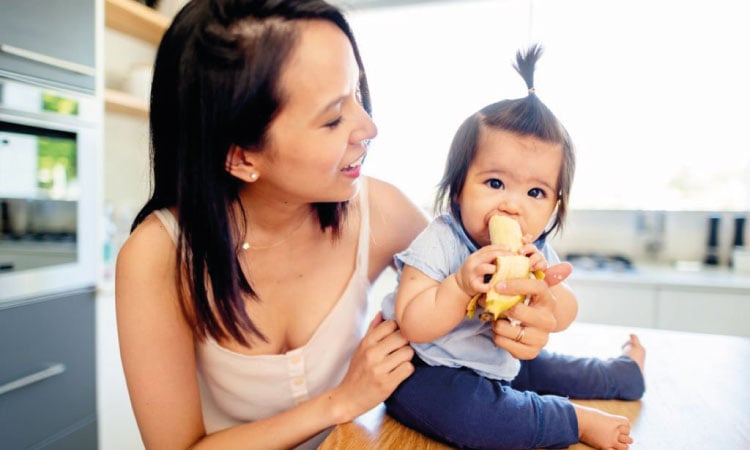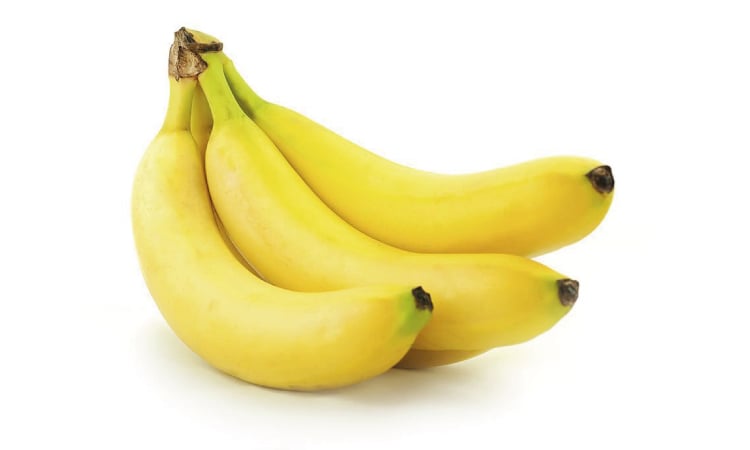The first foods for your baby should be nutritious, soft, sweet, and easy to prepare and eat. Bananas top the list. There’s a good chance you’re wondering how to serve banana to baby in the safest possible way. When it’s time to start weaning their babies off of breast milk or formula, mothers tend to opt for bananas for babies. Being rich in nutrients, banana to baby help in its overall development. This blog covers everything you need to know about feeding baby bananas, so you won’t have any questions left unanswered.
When Can A Baby Have Bananas?
As soon as your baby is 6 months old or has started eating solids, you can introduce bananas to his diet. Both babies who are spoon-fed and those who are weaning themselves will enjoy these. A small banana per day for a 6-month-old baby is ideal. Start with 2 tsp of mashed banana before moving on to other serving methods. Adding banana puree to other foods like pureed apple, pumpkin, or rice porridge will enhance their taste and nutritional value.
Nutritional Value Of Banana
Water makes up nearly three-quarters of a banana. A 100g banana contains 75g of water. Vitamins, minerals, and fiber are all packed into this tropical treat. Vitamin B6, magnesium, and vitamin C are all present in bananas. Bananas are also high in potassium, fiber, and carbohydrates.

According to the source, 100 grams of banana provides
- 97 kilocalories of energy
- 23 grams of carbohydrates.
- 4.6 g of dietary fiber
- 5 mg calcium
- 326 mg potassium
- 22 mg of phosphorus
- 28 mg of magnesium
- Vitamin C 12.3 mg
- 14 µg folate
- 8 µg beta carotene
It also has some niacin, copper, zinc, manganese, and small amounts of selenium, iodine, and iron. Low in fat and protein, bananas are an excellent source of energy.
Related Reading: Are Bananas, Milk Or Curd Given To Babies When They Have Cold?
Amazing Health Benefits Of Bananas For Babies

When it comes to baby food, bananas have a surprising number of advantages. Thanks to the essential vitamins and minerals they contain in the right proportions. Bananas have a slew of health benefits for baby, including:
1. Easy to digest
One of the main benefits of banana to baby is that they are easy to digest. Thus, it is one of the best fruits to introduce to a baby as a first food. This fruit’s high fiber content is advantageous to babies’ digestive systems. Also, pectin, a water-soluble fiber found in bananas, helps babies digest food and keeps them from getting stomach problems.
Diarrhea and constipation are common in babies. Bananas are antipathogenic. In addition to controlling diarrhea, bananas replenish lost nutrients. Constipation in babies can be alleviated by giving a mashed banana to baby, which contains dietary fiber that helps bulk up stools and absorb water. This makes the baby pass stool more easily1.
2. Bananas are incredibly convenient
Another good thing about giving a banana is that it is easy to find, cheap, and easy to bring on a trip. You don’t need to wash it. And yes, they are also on the list of easy to make finger foods for babies with no teeth. A refrigerator isn’t necessary because bananas can be stored at room temperature and don’t require special equipment to prepare this baby food. With a spoon or fork, you can easily mash them. Bananas are a great travel snack because of their high fiber content, which keeps your baby’s stomach full for longer periods of time.
3. Highly nutritious
Bananas are a great source of vitamins and minerals! Calcium, iron, folate, manganese, and potassium are just some of the nutrients found in them. Bananas contain all the essential nutrients a growing baby need. Vitamin C in bananas prevents urinary infections in babies.
4. Beneficial for the baby’s eyes
A banana with a lot of provitamin A carotenoids could be a way to get more vitamin A, which is good for baby’s eyes. Babies who eat bananas every day are less likely to have problems with their eyesight2. Vitamin A in bananas protects and enhances retinal health and improves vision. Further, potassium, found in abundance in bananas, aids in the improvement of vision.
5. Aids in preventing anemia
Bananas can help keep babies from getting anemia if they are eaten regularly. Babies who are anemic can benefit from eating bananas because they contain a variety of important nutrients that aid in the production of healthy red blood cells and enhance hemoglobin levels3.
6. Improve the quality of sleep
Optimal sleep is imperative for the growth and development of a baby. Giving banana to baby before bed may help to improve the quality of the baby’s sleep4. Bananas contain magnesium, which aids in falling asleep quickly5. Bananas have vitamin B6, which is needed to turn the amino acid tryptophan into the happy chemical serotonin. Serotonin is a neurotransmitter that controls how much melatonin is produced in the body. Melatonin is the hormone responsible for inducing sleepiness.
7. Superfood for a baby’s developing brain
Early in a baby’s life, their brain grows at a rapid rate. Bananas are known to be one of the best foods for baby’s brain development. Bananas are often called “brain food,” and there’s a good reason for that.
Bananas are full of potassium and magnesium, which give the brain energy and help it focus. As the baby develops, this helps to improve his or her capacity for concentration and learning.
The folate that can be found in bananas is beneficial to the brain development and memory function of a baby. It also prevents brain damage. Bananas also have a lot of other vitamins and nutrients that help improve brain health in direct or indirect ways6.
8. Helps with weight gain in babies
Concerned about your baby’s low weight? Bananas are one of the common foods for weight gain in toddlers. With their high carbohydrate content, bananas can help underweight babies gain optimal weight. Adding at least half a banana to the baby’s diet each day will show you how their weight fluctuates.
9. Helps alleviate constipation
Babies often have trouble pooping, especially when they start eating solid foods for the first time. The high fiber content of bananas aids in relieving constipation. If your baby has been constipated for a long time, begin giving her mashed bananas daily. It helps in relieving constipation in babies and toddlers.
10. Increases bone strength
The banana is an excellent source of potassium as well as calcium. Regularly incorporating bananas into a baby’s diet helps to strengthen and develop the baby’s bones.
11. There’s a lower chance of allergies.
As soon as mothers start giving their babies solids, they need to be on the lookout for any allergic reactions. Most allergies come from amino acids that are hard for babies to take in. There is a very low risk of food allergies when eating bananas because of the simple amino acids they contain.
Related Reading: 10 Common Reasons Your Baby Is Not Gaining Weight
Precautions To Take While Feeding Bananas To Your Baby

Bananas, for all their health benefits, are not without their drawbacks. There are many environmental and human health risks to eating conventionally grown bananas, which are heavily sprayed with pesticides. However, peeling and throwing away the banana skin helps to minimize pesticide contact. Even then, people are increasingly looking for organically grown bananas.
The following are some precautions to take when feeding bananas to babies of various ages.
- Prefer ripe bananas over unripe green bananas because they are easier to digest, sweeter, creamier, and palatable
- Many parents wonder “can we give banana to baby at night” because it helps the baby sleep better. It is best to avoid giving bananas to babies who have cough or breathing problems, even though it may help them sleep better at night. There is a chance that bananas can make a cold or cough worse by making more mucus
- Eating a banana late at night can exacerbate a baby’s bloating or gas
- Ayurveda discourages feeding bananas at night during the winter months
- “Can a baby choke on a banana?”is another concern for new mothers. To prevent choking hazards, use well-mashed, ripe bananas to make baby food. Banana puree can be mixed with breast milk or formula to make it easier for babies to swallow
- When serving the banana puree or mash for the first time for the baby, there should be no additional ingredients. The “three-day wait” rule should be followed, and new food should not be fed during this time. Banana allergies, intolerances, and sensitivities may be identified using this method
- Start with a teaspoon and work your way up to a tablespoon and finally two
- Don’t give your baby too many bananas, because they can make their stomachs full and make them less hungry for milk and other foods
- If the baby cries, squirms, or acts irritated after eating a banana, stop feeding and try again later
Related Reading: Ragi For Babies- When And How To Introduce And 8 Benefits
Basics Of How To Feed Banana To Baby?
As your child grows, so do bananas. As your baby’s palate develops and his or her tolerance for less pureed food grows, you can switch to more coarsely mashed bananas. Wondering how to serve banana to baby?
You can add banana chunks to the puree as your baby grows. In the following stages, you can gradually introduce larger chunks of bananas to your baby’s diet.
The following are the fundamentals of giving bananas to babies:
- Babies 6-8 months old should be given bananas as follows: Peel and cut the banana into small pieces. Mash the bananas with a fork until they are very soft. So, it’s easier for the baby to swallow. A baby’s transition from pureed to small solid bites occurs around the 9-month mark
- Babies 8-10 months old should be given bananas as follows: This age group would benefit greatly from banana spears. Smaller, bite-sized pieces of banana that have been split into spears can be served to a baby if he or she is having a hard time putting food in his or her mouth. It’s great for practicing pincer grasp
- Babies 10-12 months old should be given bananas as follows: A banana, peeled all the way to the center, could be given to your infant. When the baby grasps it this way, it won’t slip from his fingers. Just be sure to snip off any extra peel with scissors before giving it to him. Alternatively, cut the banana into small rounds, and then encourage your child to eat it with a fork
- Giving bananas after one-year-old: When your baby reaches the age of one, you can begin feeding him or her banana bread, pancakes made with banana flour, and baked banana chips
Conclusion

Depending on the ripeness of the fruit, nutrients can differ. More prebiotic fiber can be obtained from the less-ripe bananas compared to the ripe ones. Bananas are a great addition to a child’s diet and an excellent snack when paired with a healthy protein or fat like nut butter thinned with yogurt to reduce choking hazards. You can bake, grill (broil), or pan-fry bananas depending on the baby’s age.
FAQ’s
Summer is the ideal time to introduce a banana to your infant. During the winter, the best time to give a banana is when it is sunny and warm.
Is it safe for babies to eat bananas on a daily basis? To put it simply, the answer is yes. A small banana should be given to a baby only once a day when it comes to how many bananas he or she should consume.
When consumed in large quantities, the pectin fiber in bananas can cause constipation in babies. The banana also keeps the baby’s stomach full so that the baby will not take other nutritious food. This will negatively impact the nutritional intake.
Bananas are soft and not commonly considered a choking hazard for infants. Any food can theoretically cause choking, so watch your baby closely while they eat.
Bananas, despite their lower choking risk, can cause gagging in babies because of their tendency to stick to their gums.
Bananas are high in nutrients, but they are also delicious and filling. The consumption of one banana per day is safe for a child.
Nevertheless, too much of anything is not good. Moderation is the key when it comes to bananas for babies.
